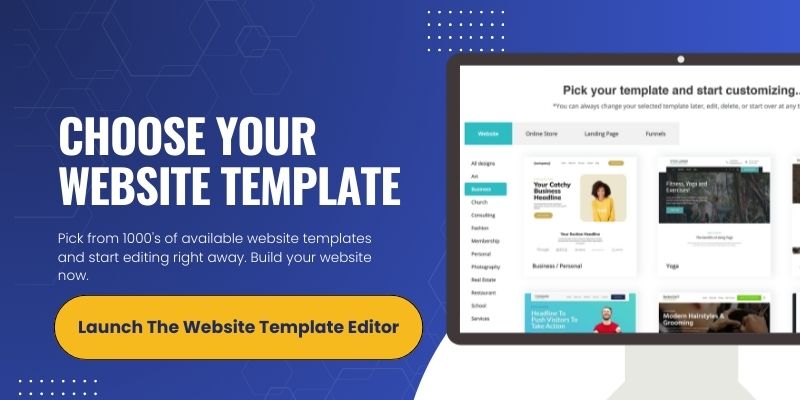Understanding Website Templates and Their Importance
What is a Website Template?
Let’s start with the basics—what’s a website template? In essence, a website template is like a pre-made package that includes all the necessary ingredients to build a website. Imagine ordering a pizza with all your favorite toppings already on it—you just have to heat it up! Website templates often include HTML, CSS, and sometimes JavaScript files that make the development process a cinch.
Using templates saves a ton of time. Instead of coding from scratch, you can customize existing designs to fit your needs. It’s perfect for both seasoned developers looking for quick solutions and novices wanting to get their feet wet without hassle. Plus, they keep your project organized.
It’s well worth mentioning that while templates are super helpful, they can sometimes feel like a double-edged sword. If you’re not careful, you could end up with a website that looks just like a million others out there. And that’s where customization comes into play—make it yours!
Top Free Website Template Options
Bootstrap Templates
One of my go-to resources is Bootstrap templates. Bootstrap is a framework that’s widely used for building responsive web designs. The awesome thing is that you don’t have to be a coding wizard to work with it. Just grab a template, and voilà! You’re on your way to a polished look.
What I love about Bootstrap is its versatility. You can find templates tailored for blogs, portfolios, e-commerce sites, and more. The community is also incredibly supportive, so if you hit a snag, chances are you’ll find answers quickly online.
Plus, with so many available for free, it’s a fantastic starting point for developers on a budget. Of course, you may want to invest in premium options later on, but for initial projects, Bootstrap offers some gems!
WordPress Themes
If you’re diving into the world of content management systems (CMS), WordPress is where it’s at. While technically different from website templates, WordPress themes serve a similar purpose. There are tons of free themes you can choose from that are incredibly customizable.
My advice? Take your time browsing them. Each theme comes with different features, and finding one that matches your vision can take some digging. But trust me, it’s worth it when you hit that perfect match!
Also, many free WordPress themes are designed with SEO in mind. This is crucial if you want your site to reach a wider audience. So, while you’re sorting through themes, keep in mind the long-term benefits of making a smart choice from the start.
HTML5 Templates
Don’t underestimate the power of HTML5 templates! These are fantastic if you’re looking to build a site with a modern flair. HTML5 templates often include rich media content and are optimized for mobile—critical factors for today’s web users.
One of my personal experiences with HTML5 templates was developing a landing page for a startup. I found an effective free template that not only looked appealing but was also highly functional. With some customization, it became a major asset for the business!
As a bonus, most HTML5 templates are lightweight and load quickly, which is a huge plus for user experience. And let’s face it: no one wants to wait around for a slow-loading website.
Exploring Premium Website Template Options
ThemeForest Templates
Now, moving onto the premium side of things, and if you’ve dabbled in web design, you probably know about ThemeForest. They offer fantastic website templates for a reasonable price. The variety is mind-blowing, with thousands of options across different niches.
The best part? You get great support and updates when you purchase a premium template. Trust me, nothing feels worse than buying a template and realizing you have no one to turn to when something goes wrong!
I once purchased a premium template for an online store project, and the difference in quality was undeniable. Everything felt so polished, and the backend was user-friendly, helping to streamline development significantly.
Template Monster
If you’re seeking something specific, Template Monster has you covered. Their catalog is impressive, catering to various industries and web needs. Whether you’re running a corporate site or a personal blog, they have options that can give you that professional edge.
In my experience, their templates come with extensive documentation. This is a huge relief when you start customizing, as good documentation means you won’t be stuck Googling for hours. Everything feels straightforward, which I really appreciate.
Moreover, Template Monster often hosts sales and discounts, so you can snag a high-quality template at a lower price, which is always a win in my book!
Wix & Squarespace Templates
Lastly, let’s not forget about platforms like Wix and Squarespace! They offer easy-to-use website builders with templates that look stunning. If you’re looking to set up a portfolio or a small business website quickly, these platforms can be a lifesaver.
While these templates are mostly drag-and-drop, they still allow for significant customization. I’ve personally built several websites on both platforms, and I found the process smoother than I expected—perfect for those who don’t want to dive too deep into coding.
However, keep in mind that these platforms have recurring fees, which can add up over time. So if you’re in it for the long haul, weigh your options carefully!
Final Thoughts on Choosing Website Templates
Assess Your Needs
Before diving into the world of templates, it’s essential to assess what your specific needs are. Are you building a blog, an online store, or perhaps a portfolio to showcase your work? Understanding the purpose of your website will make selecting the right template way easier.
As I mentioned, not every template fits every project. Taking a few moments to write down your goals can help steer you toward the best options. Believe me; this step can save you from headaches later on!
In my case, I’ve often sidestepped potential pitfalls by taking that extra step to clarify my vision upfront.
Customization and Scalability
Once you’ve narrowed down your options, think about how customizable the templates are. A template should be a launching pad, not a limitation. I always look for templates that give me room to grow—that way, if my project evolves, my website can evolve with it.
In my own experience, finding templates that facilitate easy customization makes my life a lot simpler. I can pull the elements I want and discard the rest, ensuring that my website doesn’t look cookie-cutter.
Also, consider future scalability. You might start small, but if you think you’ll need more pages or features down the line, select a template that can grow with you!
Support and Updates
Finally, always take a gander at the support and updates offered with the template. This is especially true when you’re investing in a premium template. It’s crucial to have access to ongoing support in case you run into any issues.
Templates that are regularly updated are typically more aligned with new technologies and standards, which means they’ll perform better in the long run. No one wants a website that’s outdated after a couple of months!
In summary, choosing the right template can significantly impact your web development journey. So take your time, do your research, and let your creativity flow!
FAQ
1. What is a website template?
A website template is a pre-built design for a website that includes layout, structure, and often some built-in functionality, allowing developers to create a site quickly and efficiently.
2. Are there free options available for website templates?
Yes, there are plenty of free website templates available. Some popular sources include Bootstrap, WordPress, and HTML5 templates. They can be a great starting point for any project.
3. What are the advantages of using premium website templates?
Premium templates often come with better support, regular updates, and more advanced features. They can save you a lot of time and frustration, especially if you encounter issues during development.
4. How do I know which template is right for my project?
Consider the purpose of your website, your target audience, and the functionality you need. Doing this will help you narrow down your options effectively.
5. Can I customize a template?
Absolutely! One of the best aspects of templates is their customizability. Most templates allow you to tweak designs, colors, layouts, and content to match your personal style or brand.

